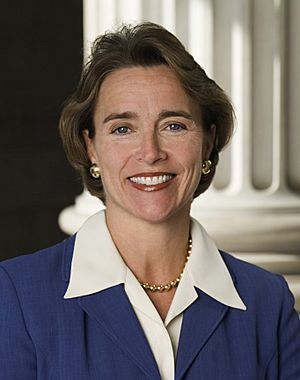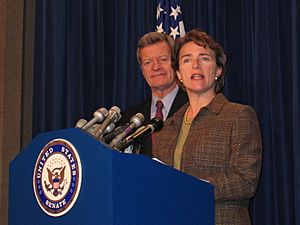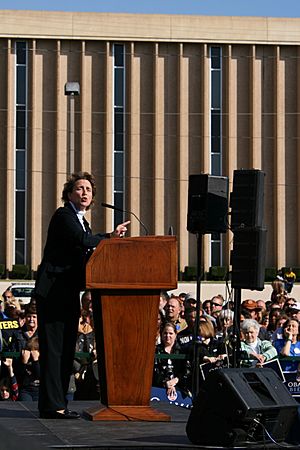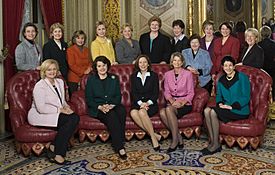Blanche Lincoln facts for kids
Quick facts for kids
Blanche Lincoln
|
|
|---|---|

Official portrait, 2007
|
|
| United States Senator from Arkansas |
|
| In office January 3, 1999 – January 3, 2011 |
|
| Preceded by | Dale Bumpers |
| Succeeded by | John Boozman |
| Chair of the Senate Agriculture Committee | |
| In office September 9, 2009 – January 3, 2011 |
|
| Preceded by | Tom Harkin |
| Succeeded by | Debbie Stabenow |
| Member of the U.S. House of Representatives from Arkansas's 1st district |
|
| In office January 3, 1993 – January 1, 1997 |
|
| Preceded by | William Alexander |
| Succeeded by | Marion Berry |
| Personal details | |
| Born |
Blanche Meyers Lambert
September 30, 1960 Helena, Arkansas, U.S. |
| Political party | Democratic |
| Spouse |
Steve Lincoln
(m. 1994) |
| Children | 2 |
| Relatives | Mary Lambert (sister) Lincoln family (by marriage) |
| Education | University of Arkansas, Fayetteville Randolph College (BS) |
| Signature | |
Blanche Lambert Lincoln (born Blanche Meyers Lambert on September 30, 1960) is an American politician. She served as a United States Senator for Arkansas from 1999 to 2011. She is a member of the Democratic Party.
Blanche Lincoln was first elected to the Senate in 1998. She was the first woman elected to the Senate from Arkansas since Hattie Caraway in 1932. At 38 years old, she was also the youngest woman ever elected to the Senate at that time. Before becoming a Senator, she served in the United States House of Representatives from 1993 to 1997.
Lincoln was the first woman and the first person from Arkansas to lead the U.S. Senate Committee on Agriculture, Nutrition and Forestry. She also helped lead the Senate Democratic Caucus in reaching out to rural communities. In 2010, she ran for a third term but lost to Republican John Boozman. Today, she is the founder of Lincoln Policy Group, a company that helps advise on government policies.
Contents
Early Life and Education
Blanche Lambert was born in Helena, Arkansas. Her parents were Martha and Jordan Bennett Lambert. Her father was a farmer who grew rice and cotton. Her older sister, Mary Lambert, is a film director.
Blanche went to public schools in Helena. She was the student council president at Central High School from 1977 to 1978. After high school, she attended the University of Arkansas in Fayetteville. She later graduated from Randolph College in Virginia in 1982 with a degree in biology. She had originally planned to become a nurse.
After college, Lincoln worked for U.S. Representative Bill Alexander until 1984. Her husband, Steve Lincoln, whom she married in 1994, is a distant relative of former President Abraham Lincoln. Blanche Lincoln is an Episcopalian.
Serving in the U.S. House of Representatives
In 1992, Blanche Lincoln won the Democratic primary election against Bill Alexander. She then won the general election, becoming a member of the U.S. House of Representatives. Her election happened at the same time as fellow Arkansan Bill Clinton became President.
Lincoln described herself as a "centrist Democrat." This means she held views that were often in the middle, not too far left or right. She supported some laws that aimed to change federal employment rules and voted to limit certain types of class action lawsuits. She also supported making rules for personal bankruptcy stricter. Lincoln was one of the few Democrats who voted for tax cuts proposed by the Bush administration. She also supported getting rid of the estate tax permanently.
In 1995, she voted for a tax relief act. She also supported a change to the Constitution that would require the government to have a balanced budget. In 1996, she supported the Freedom to Farm Act, which changed how the government supported farmers.
She was reelected for a second term under her married name, Blanche Lincoln. She served in the House until 1997. She decided not to run for re-election in 1996 because she was pregnant at the time.
In 1993, Lincoln (then Blanche Lambert) was one of the first three women to play in the yearly Congressional Baseball Game.
Serving in the U.S. Senate
First Term in the Senate
In 1998, Lincoln decided to return to politics. She ran for the Senate seat that was being left open by Senator Dale Bumpers. She won the election against her Republican opponent, Fay Boozman.
During her first term, Lincoln focused on issues important to farmers and people living in rural areas. She was a strong supporter of the Delta Regional Authority. This group was created to help bring growth and development to the lower Mississippi Delta region.
Second Term in the Senate
In 2004, Lincoln was re-elected to the Senate. She won against Republican state Senator Jim Holt.

In 2007, Lincoln asked for the resignation of Attorney General Alberto Gonzales. She believed that the firing of eight federal prosecutors had caused a serious break between the Justice Department and Congress.
In 2007, Lincoln played a key role in creating a compromise that led to the passage of the Food, Conservation, and Energy Act of 2008. This law, also known as the "farm bill," provides money for nutrition, conservation, rural development, and renewable energy. Lincoln worked hard to prevent an amendment to the farm bill that would have limited government payments to farmers. She argued it would be unfair to some farmers in Arkansas, especially cotton growers.
Lincoln was featured in the 2007 documentary 14 Women, which was directed by her older sister, Mary Lambert.

In September 2009, Lincoln said she would block any law that included a public health insurance option. This surprised many Democrats. However, she later voted for the Patient Protection and Affordable Care Act, which became the Obama administration's health care reform law. She did vote against a package of changes to that law.
Lincoln's votes on health care showed her as a "conservative Democrat." This helped her avoid being seen as too "liberal" by voters in Arkansas, where many people were becoming more Republican. In 2009, she spoke out against a bill that would have made it easier for workers to form unions. This earned her praise from some conservative groups but criticism from labor unions.
In November 2009, Lincoln voted against bringing prisoners from Guantanamo Bay to the United States for trial.
On December 9, 2010, Lincoln missed a very important vote to repeal "Don't ask, don't tell" because she was at a dental appointment. She supported the bill and said she would have voted for it if she had been there. On December 18, she voted in favor of the bill's final passage.
Committees and Groups
In 2004, Lincoln helped start the Senate Hunger Caucus. This group brings together Senators from both parties to discuss and work on issues related to hunger and food problems in the U.S. and around the world.
Lincoln also helped create the Moderate Dems Working Group. This group of moderate Democratic Senators works with Senate leaders to find solutions to political issues that both parties can agree on. She also co-founded Third Way, a moderate think tank. This group focuses on economic growth, shared values, national security, and clean energy.
Lincoln served on several important committees, including the Senate Finance Committee and the Special Committee on Aging. She also chaired the Rural Outreach for the Senate Democratic Caucus.
On September 9, 2009, she became the Chairman of the Senate Agriculture, Nutrition, and Forestry Committee. She was the first person from Arkansas and the first woman to lead this committee in its 184-year history.
After Congress
After losing her re-election in November 2010, Lincoln stayed in Washington, D.C. She worked as a Special Policy Advisor at a law firm called Alston & Bird.
In 2011, Lincoln became the chair of Small Business for Sensible Regulations. This project is part of the National Federation of Independent Business.
In July 2013, Lincoln started her own political consulting company called Lincoln Policy Group.
As of November 2020, Lincoln is an advisor for the RATE Coalition. This group works to lower corporate tax rates. She has given many speeches to Congress for this organization about corporate tax rates.
Images for kids
See also
 In Spanish: Blanche Lincoln para niños
In Spanish: Blanche Lincoln para niños
 | Emma Amos |
 | Edward Mitchell Bannister |
 | Larry D. Alexander |
 | Ernie Barnes |



